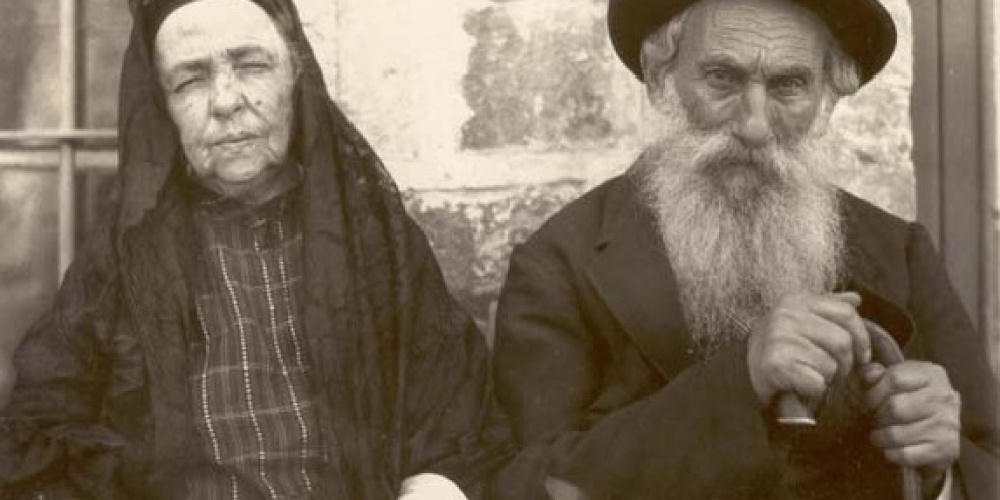
Our society venerates youth, with an entire industry dedicated to keeping people looking and feeling young. While youth is great, it is old age that our tradition venerates.
“For an old person you shall rise, v’hadrata pnei zaken, and give honour to the elderly” (Vayikra 19:32). While our society equates beauty with youth, the Torah emphasizes that it is the zaken the old one, who is hadar, beautiful. Old age allows one to share wisdom and insight that only life experience can bring. This experience is so valuable that Jewish law (Kiddushin 32b) rules in accordance with the view of Issi ben Yehuda that the command to stand for the elderly “includes all the elderly” – including a zaken ashmai. Even if we accept the definition of the Tosafists that a zaken ashmai refers to a boor v’am ha’aretz, a boorish ignoramus, this is quite telling. And if we accept the understanding of Rashi (which we don’t) that it refers to a rasha v’am ha’aretz, an evil ignoramus, then the veneration of old age is simply astounding. Imagine how much honour we must give to the truly wise and pious elderly. It is growing from life’s experience that is truly beautiful.
While many spend much time, effort and money to look young, preferring that to distinguished grey hair, there was a time when apparently such was not necessary. “Until Abraham there were no signs of old age” (Bava Metzia 87a). What could be better than eternal youthful appearance? For starters, it might be hard to tell people apart and the Gemara continues, “whoever wished to speak to Avraham would [often] speak to Yitzchak, and one who wished to speak to Yitzchak would [often] speak to Avraham.“ With Yitzchak looking like his father and with no discernible signs of aging, it was next to impossible to tell father and son apart. “Thereupon Abraham prayed for mercy, and old age came into existence” (Bava Metzia 87a).
The Midrash need not be interpreted literally and we need not think that Abraham’s main concern was that of identification. “And Abraham was old, full of days and G-d blessed him with everything” (Breisheet 24:1). Abraham understood that there are different stages in life. As Rav Soloveitchik so beautifully explains regarding Sarah (see here), a full life is one in which we experience the innocence and wonderment of a child, the vigor of youth, and the maturity and wisdom of old age. There is little more valuable and beautiful for children than to interact with their grandparents. It is one of the reasons we bless our children every Friday night that they should be like Ephraim and Menashe, the first children to have a connection to their grandfather.
To remain as a (figurative) child throughout one’s life without maturing into an adult is sad indeed. If one can confuse a parent and a child, we need to ask G-d to have mercy upon us. In the immediately prior teaching, the Sages note that Yitzchak looked just like his father – hence the impossibility of telling them apart. Youth and maturity must resemble each other, but they dare not be identical. Gray hair - at the right time - is something worth praying for.
This was not the only prayer to change the “natural order” of things. This coming Shabbat we will encounter for the very first time in the Torah someone getting sick. “Until Jacob there was no illness: then Jacob came and prayed, and illness came into being.” Until the death of Yaakov all we are told is that so and so died – without warning. Our Sages claim that one sneezed and died hence the minhag to wish someone a long life when they sneeze. This may be physically appealing, but is morally wanting. Most need to have warning about their impending demise to allow them to put their affairs in order. Yitzchak, fearing that death was near, called Eisav to give him a final blessing. Yet having no idea when he might actually die, he blessed his children some 60 years too“early.”
Yaakov is the first person given the opportunity to give a charge to his children on his deathbed. It was this knowledge that allowed him to be blunt with his children, offering advice and criticism that would have gone unheeded and even resented if given in good health.
If the purpose of sickness is to help one prepare for death, the latter should soon follow the former. And so it was, the Talmud claims, until the time of Elisha. “Until Elisha no sick man ever recovered, Elisha came and prayed, and he recovered.” Recovery from sickness is thus a second lease on life, a chance to build on one’s prior experiences to live a more meaningful life.
Rav Soloveitchik explains that one of the main purposes of sitting shiva r”l is inspiring the living to do teshuva. When an immediate relative passes away we come face to face with the frailty of life, how we are here today and gone tomorrow. Death itself is the great motivator, forcing us to act before it is too late. Thus Rav Meir claims that “very good” in the verse “G-d saw all that He had made and behold it was tov meod, very good” (Breisheet 1:31) refers to death. Without a deadline, we would accomplish much less[1]. We could literally procrastinate forever. How sad when death does not move us to do better.
Fortunate are those who recover from a serious illness using that experience to propel them to live their “extra years” with greater purpose and meaning.
Old age, sickness, even death, though we like to avoid them for as long as we can, can and must be great catalysts for moral growth.
[1] Death also allows for those who are younger to rise to the top. Without “fresh blood” organizations and life itself withers.



